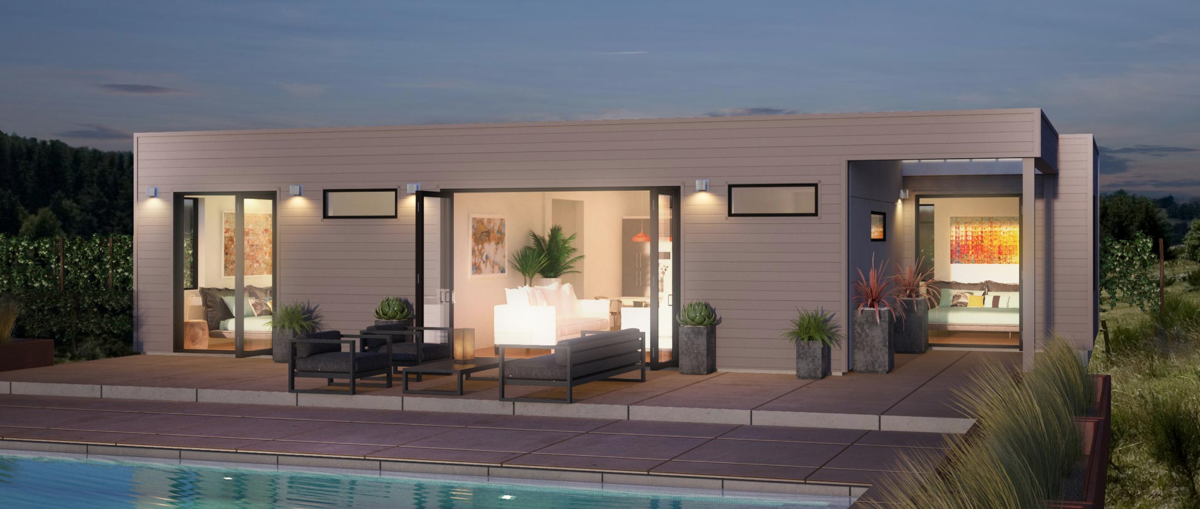Manufactured homes are frequently less expensive than traditional single-family homes, even those of comparable size and location. This is primarily due to the construction process's efficiency.
Manufactured homes are built in a factory setting off-site, allowing for a quick, efficient, and low-cost assembly-line approach. Because their construction is not affected by local weather conditions, they can be manufactured more quickly and in larger quantities than traditional homes. Finally, high-volume manufacturing allows manufacturers to buy supplies and building materials in bulk, resulting in lower consumer costs.
Learn more about manufactured home prices.
Important Takeaways
- A manufactured home costs an average of $57,700 in 2020, but prices vary depending on size, location, and other factors.
- Choosing a permanent foundation secures your manufactured home but raises the cost.
- The cost of extending utilities to your manufactured home will be higher if you place it on undeveloped land.
- Taxes on manufactured homes vary depending on where you live and whether you own or rent the land on which the home is built.
What Factors Influence Manufactured Home Prices?
How cheap are manufactured homes? That is dependent on a number of factors.
One of the most powerful influences is size. In 2020, the average price of a single manufactured home, which could be anywhere between 784 and 1,440 square feet, was $57,700, according to the US Census Bureau. It was $48,300 for a smaller manufactured home (around 1,000 square feet), and $109,300 for a larger, double-wide property (about 1,700 square feet). The manufacturer also influences the cost of the home.
Other factors influencing the cost of manufactured homes are as follows.
Expenses for Land
With manufactured homes, you have two options: purchase a lot on which to construct, or rent land in a mobile home park or other community of a like nature. The cost of both options varies greatly depending on where you live. Rural areas, on average, have lower land prices than urban and suburban areas.
Foundation
In order to guarantee the long-term viability and security of your home, you may decide to construct a permanent foundation beneath it if you own the land. Manufactured home foundations differ in price because they can include basements and crawl spaces.
Utility Connections
Once your home is built, you'll need to connect it to utilities such as water, sewage, electricity, cable, and internet service. The costs of these services vary depending on where you live and which utility provider you use, and they can be especially high on undeveloped land. You must pay to have utilities extended to your home, as well as a fee for the actual hook-up.
Utilities may be included in the monthly rent in some mobile home communities.
Setup and delivery
Delivery is frequently included if you live within a certain radius of a manufacturer's facility. Otherwise, you'll most likely have to pay a fee based on the number of miles you've driven since the manufacturer. Other delivery costs may apply if you require an escort vehicle or multiple trucks.
When your home arrives, it will need to be set up and assembled. Depending on the manufacturer, you may also be charged for assembly.
Taxes
The taxation of manufactured homes varies by state and whether the home is built on your own land or in a mobile home park. For example, in California and Oregon, you'll pay state and local taxes at roughly the same rate as for built-on-site properties—typically between 0.72 and 0.98 percent. Arizona, Washington, and New Mexico all consider manufactured homes to be real estate, as long as they are built on permanent foundations.
Personalizations for the Home
Many manufacturers offer the option of customizing their home designs. Fireplaces, built-in desks and shelves, appliances, and other items are examples of interior customizations, while siding types, decorative doors, and roof updates are examples of exterior customizations. All of these come with additional costs that vary depending on the level of customization and your specific manufacturer.
Insurance
Finally, as with any home purchase, you'll want to protect your investment with insurance. Weather damage, fire, and theft are all covered under manufactured and mobile home insurance. If your house is being shipped somewhere, think about getting travel insurance.
Note: Please keep in mind that not all insurance companies will cover manufactured homes, so give yourself plenty of time to shop for a policy.
How to Finance Your Manufactured Home
Even if a manufactured home is less expensive than a traditionally built home, that doesn't mean you have to pay any less. Manufactured and mobile home loans can assist you in financing your purchase and repaying it over time. Manufacture home retailers or specialized mobile home lenders frequently offer these loans. You can refinance these loans at a later date, just like a traditional mortgage.
Questions and Answers (FAQs)
Is it more expensive to build a house or buy a manufactured home?
The Manufactured Housing Institute claimed in 2020 that the cost of a manufactured home was less than half that of a site-built home: $55 per square foot vs. $114. The price of land, hookups, transportation, and customization is not included, though. You'll need to crunch the numbers to see if a manufactured home is the best option for your budget.
Is it possible to get a government-insured loan for a manufactured home?
Loans for manufactured homes are available through the Federal Housing Administration (FHA), the Department of Veterans Affairs (VA), and the Department of Agriculture's Rural Housing Services (RHS).


